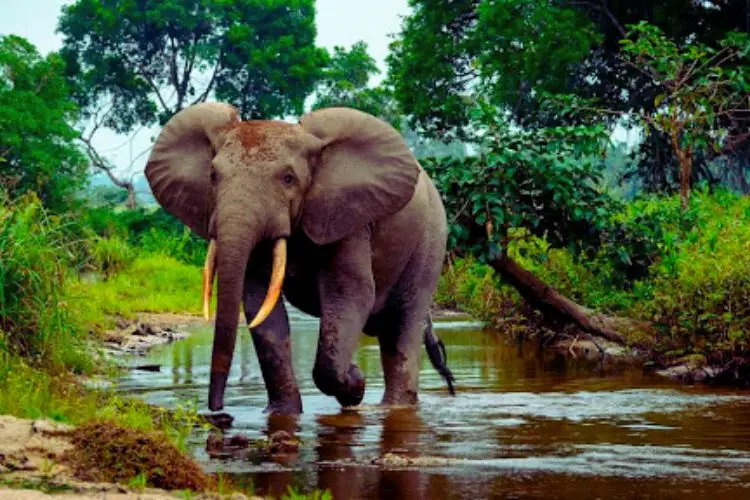
Explore the fascinating kingdom of elephants with our curated collection of 10 amazing facts. Elephants, titans of the land, fascinate with their intelligence, social complexity and ecological importance. From their subtle communication techniques to their exceptional memories, these majestic animals are symbols of wonder and resilience
Embark on a journey deep into elephant lore, uncovering the mysteries that define these remarkable creatures Whether you’re an aficionado or an inquisitive novice, our extensive collection has all aspects of elephant lore you’re looking for.
10 amazing facts about elephants that everything you need to know about elephants
10. Elephant scientific name facts
The scientific name for elephants is derived from two distinct genera: Loxodonta and Elephas:
1. African Elephant: Loxodonta africana.
2. Asian Elephant: Elephas maximus.
These names encapsulate the unique genetic and morphological characteristics of each species. They signify not just taxonomy, but also the rich evolutionary history and ecological significance of these majestic creatures. Through their scientific names, elephants transcend mere classification, embodying the wonders of biodiversity and the complexities of our natural world.
09. Facts about elephants habitat
Elephants, the largest living land animals, are known as “ecosystem engineers” who shape their habitats through a variety of activities. They excavate dry riverbeds, make watering holes and spread seeds with their dung.
In the forest, they feast on trees and shrubs, making way for small animals. In the savanna, they uproot trees and eat saplings, leaving the landscape open for zebras and other plains animals to thrive.
08. Facts about elephants memory
Elephants have the largest brains of all land mammals, famous for their extraordinary memory.Comparable to dolphins and primates, these abilities enable them to remember others and humans over the years, recall water sources and food locations, and recognize unfamiliar elephants. Their cognitive abilities are crucial for their survival and social behavior.
07. Facts about elephants in kenya
Kenya is home to the African elephant, the world’s largest land animal, with the largest measuring 7.5 meters long and weighing 6 tonnes. Communication between elephants occurs at an infrasound level, with 50 square kilometers filled with specific elephant calls.These intelligent and socially complex animals help maintain forests by eating plants, fruits and seeds, traveling long distances and defecating in different places.
06. Asian elephant vs african elephant
African and Asian elephants have distinct characteristics, African elephants have larger ears and tusks, while Asian elephants have smaller, rounder ears. Males have African tusks, while only a few males have Asian tusks.The head of the African elephant is more rounded, while the double-domed head of the Asian elephant with visible divot lines highlights the difference between the two species.
05. Interesting facts about elephants in africa
The African elephant is the largest land animal in the world, measuring up to 3 meters in length and weighing up to 6,000 kg. They can be identified by their large ears and recognize themselves in a mirror, which makes them unique among animals.These fascinating facts highlight the complexity, intelligence and importance of the ecosystem in which African elephants live.
04. What do elephants eat
Elephants consume a bewildering array of vegetation, including trees and water, to sustain their massive bodies. Their diet consists of grasses, leaves, fruits and bark, feeding an average of 300 pounds per day.Seasonal variations affect their diet, causing them to migrate for fresh vegetation and water sources. Understanding the dietary preferences of elephants is crucial for conservation efforts and habitat management strategies.
03. How much does an elephant eat a day
On average, an elephant can consume 200 to 600 pounds (90 to 270 kilograms) of food per day, depending on factors such as its size, age, and the availability of food in its habitat. This mass intake consists primarily of grasses, leaves, fruits and bark.
Elephants have a high metabolic rate due to their large size and require substantial amounts of food to maintain their energy levels and maintain their body condition.
02. How long do elephants live
Asian and African elephants live longer, averaging 65 years or more. Female African elephants live longer, with a maximum lifespan of 74 years.For Asian elephants, it is about 80 years. In captivity, the stress of poor mental health reduces the lifespan of elephants, potentially leading to early death. Longevity is crucial for survival and social behavior.
01. World's Largest Land Animal: The African Savanna Elephant
The African savannah elephant holds the prestigious title of the world’s largest land animal. At its majestic height, it commands awe with its sheer size and presence. Its teeth, a symbol of strength and grace, inscribe stories of resilience and survival across the African savannah.
This majestic creature symbolizes the complex balance of nature, embodying both strength and weakness in its vast domain. As a keystone species, its conservation is paramount, echoing the interconnectedness of all life on Earth.
conclusion :
Elephants are truly remarkable animals with unique characteristics and behaviors that make them fascinating to learn about. From their incredible intelligence and self-awareness to their vital role in ecosystems, elephants continue to fascinate and inspire.
As we uncover 10 surprising facts about these gentle giants, we are reminded of the urgency of protecting and preserving their existence for future generations. Let’s share these incredible facts to raise awareness and contribute to the welfare of these majestic animals


